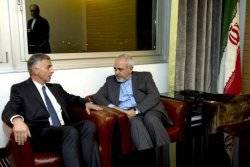Iran and six world powers reached a breakthrough agreement to curb Tehran's atomic ambitions in exchange for limited sanctions relief, in a first step towards resolving a dangerous decade-old standoff.
The deal between Iran and the United States, France, Germany, Britain, China and Russia was nailed down early on Sunday after more than four days of negotiations.
President Barack Obama says a nuclear deal with Iran is an "important first step" toward addressing the world's concerns over the Islamic republic's disputed nuclear programme.
Obama says the deal includes "substantial limitations'' on Iran and cuts off the Iran's most likely path to a bomb.
US Secretary of State said the deal does not recognize Iran's right to enrich uranium.
Tehran will halt progress on enrichment capacity and stop advancing on the heavy water reactor at Arak, in return there will unprecedented transparency and open access to international weapons inspection.
The Iranian Foreign Minister Mohammad Javad Zarif said, "I hope we can start restoring the lost confidence.
"The Iranian people demand respect for their rights and dignity, it is important to restore their confidence and I hope this process can do that."
European Union foreign policy chief Catherine Ashton said "I'm delighted that we have got there, we are confident for a long term deal, this is the first step as you will see its very much within the framework of reaching a comprehensive agreement."
Speaking from Tehran Al Jazeera's Soraya Lennie said "Iranians have been waiting over a decade for a positive outcome.
"They are waking up to the news in a much more positive mood than at any other time during any of these talks," she added.
Frozen funds
The talks were aimed at finding a package of confidence-building steps to ease decades of tensions and banish the specter of a Middle East war over Tehran's nuclear aspirations.
The Western powers' goal had been to cap Iran's nuclear energy programme, which has a history of evading UN inspections and investigations, to remove any risk of Tehran covertly refining uranium to a level suitable for bombs.
Tehran denies it would ever "weaponize" enrichment.
The draft deal that had been under discussion in Geneva would see Iran suspend its higher-grade uranium enrichment in exchange for the release of billions of dollars in Iranian funds frozen in foreign bank accounts, and renewed trade in precious metals, petrochemicals and aircraft parts.
Iran will get access to $4.2 bn in foreign exchange as part of the agreement, a Western diplomat said on Sunday.
Refined uranium can be used to fuel nuclear power plants - Iran's stated goal - but also provide the fissile core of an atomic bomb if refined much further.
Diplomacy was stepped up after the landslide election of Hassan Rouhani, a relative moderate, as Iranian president in June, replacing bellicose nationalist Mahmoud Ahmadinejad.
Rouhani aims to mend fences with big powers and get sanctions lifted. He obtained crucial public backing from Supreme Leader Ayatollah Ali Khamenei, keeping powerful hardline critics at bay.
PHOTO CAPTION
Switzerland's Foreign Minister Didier Burkhalter (L) talks with Iranian Foreign Minister Mohammad Javad Zarif during a meeting at the Intercontinental Hotel, in Geneva, on November 23, 2013.
Aljazeera


 Home
Home Discover Islam
Discover Islam Quran Recitations
Quran Recitations Lectures
Lectures
 Fatwa
Fatwa Articles
Articles Fiqh
Fiqh E-Books
E-Books Boys & Girls
Boys & Girls  Women
Women










